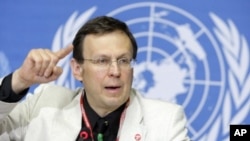The World Health Organization is calling on governments to ban the use of blood tests for active tuberculosis. It says these tests are harmful and can lead to death. This is the first time the organization is publicly warning against a practice widely used in tuberculosis care.
The World Health Organization warns the use of currently available commercial blood tests to diagnose active tuberculosis often leads to misdiagnosis, mistreatment and potential harm to public health.
The Director of the WHO Stop TB Department, Mario Raviglione, says 12 months of rigorous analysis of these blood tests shows they are dangerous and governments should end their use.
“There is overwhelming evidence that reveals that these blood tests are imprecise, they are inaccurate," said Raviglione. "So, we urge the doctors and all care givers that deal with tuberculosis to stop using the blood test immediately and instead diagnose active disease, using active TB, using those tests that we have been recommending over the past three or four years.”
WHO recommends a new simple and rapid molecular test, which it endorsed at the end of last year. The test diagnoses regular TB as well as drug-resistant TB in 100 minutes. It costs about $16, which is considerably lower than the $30 price of a commercial blood test.
WHO reports at least 18 of these commercial blood tests are available on the market. Most are manufactured in Europe and North America, but are mainly used in developing countries, where tuberculosis is a huge problem.
The blood test is sold in all regions of the world. It is most extensively used in India, but is also widely used in countries such as China, Pakistan, and Afghanistan, as well as in several African and East European countries.
WHO says more than one million of these inaccurate blood tests are carried out every year to diagnose active TB. Karin Weyer, the Coordinator TB Diagnostics and Laboratory Strengthening for the WHO Stop TB Department, says one out of two patients will receive a wrong diagnosis-either a false positive or a false negative.
“A false negative means that patients with TB receive a diagnosis that says they do not have TB, so they continue to transmit disease to others and they may die because their TB is not being treated," said Weyer. "With false positives, obviously, patients are put on unnecessary TB treatment while the underlying cause of the illness remains undiagnosed.”
Dr. Weyer says the sale of these sub-standard tests is a multi-million dollar business. She says manufacturers have a strong financial incentive to keep selling their dangerous product and often will resort to unethical practices to achieve this.
The World Health Organization reports there are 9.4 million new active cases of TB a year. It estimates tuberculosis kills 1.7 million people every year, including 400,000 who are living with HIV. The U.N. health agency says improving the early and effective diagnosis of TB will save many lives.
WHO Warns Against Use of Blood Tests for Active Tuberculosis
- By Lisa Schlein











